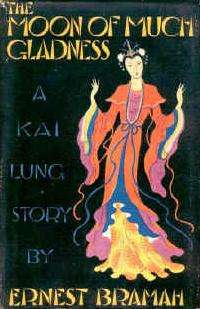The Moon of Much Gladness
 Dust-jacket from the first edition | |
| Author | Ernest Bramah |
|---|---|
| Country | United Kingdom |
| Language | English |
| Series | Kai Lung |
| Genre | Fantasy novel |
| Publisher | Cassell |
Publication date | 1932 |
| Media type | Print (Hardback) |
| Pages | 316 pp. |
| Preceded by | Kai Lung Unrolls His Mat |
| Followed by | Kai Lung Beneath the Mulberry Tree |
The Moon of Much Gladness is a fantasy novel by Ernest Bramah, perhaps told by Kai Lung, Bramah's fictional itinerant story-teller of ancient China. It was first published in hardcover in London by Cassell and Company, Ltd. in May 1932, and was reprinted in 1934. The first American edition was issued by Sheridan House in 1937.
While the fictional narrator of this novel never refers to himself by name, the British first edition is subtitled "A Kai Lung story," and the American edition has the title The Return of Kai Lung. The final sentence of the novel perhaps gives the best indication:
"Justice having thus been impartially weighed out and the fundamental equipoise suitably maintained, nothing remains for an admittedly tedious and obsolete describer of unvarnished facts but to roll up his threadbare mat once more, bow right and left with ingratiating submission, and--not, perchance, without an inoffensive glance at his ill-lined collecting bowl--await your distinguished judgment."
Elsewhere in the book, the narrator refers to writing his story, rather than telling it, and there is none of the interaction with listeners that marks the other Kai Lung stories. Regardless of the view one takes on this, the story is otherwise much in the style of the other tales, and takes place in a similarly fictionalized China.
Unlike the others, it is a true novel rather than a string of short stories. The queue of the mandarin T'sin Wong has mysteriously vanished while he slept. The maiden Hwa-che seeks to solve the mystery, using the methods she has learned from the crime novels of the Western barbarians. In this she is aided by Chin-tung, the mandarin's male secretary. Initially disguised as a man, she and Chin-tung become increasingly attached to each other as the story progresses.
The story humorously spoofs the conventions of the mystery novel, and contains allusions to well known fictional detectives. Readers will catch allusions to Sherlock Holmes, Lord Peter Wimsey, and Hercule Poirot, among others. As with Bramah's other Chinese stories, much of the humor is also derived from a mock "Chinese" re-phrasing of common English expressions.
At this writing, The Moon of Much Gladness appears to be out of print, but used copies are available.
References
- "Ernest Bramah Bibliography". Retrieved 2007-09-28.